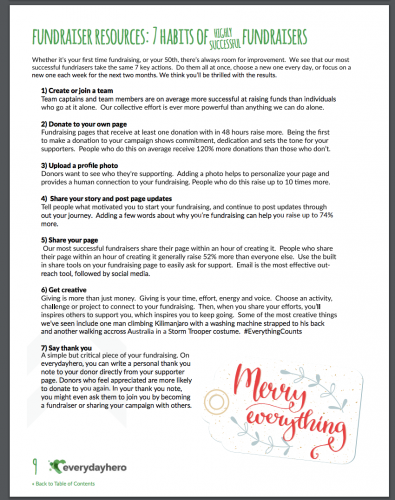Recently, we've heard from some everydayhero customers that they're just not sure about how to start using their everydayhero Pro tool, what they should use it for, or what kind of campaign they should launch. If this sounds like you, the below checklist may be a great resource for you!
We've outlined 10 key actions you can to take to start, launch and run a successful peer-to-peer campaign. Grab a notepad and take some notes as you read through each action. By the time you're done, you'll be well on your way to launching your next everydayhero campaign!
1. Set a goal. Your campaign goal should be realistic, specific and clear. Ask yourself:
• What are you trying to fund?
• Calculate an achievable goal and set the goal on your page
• What mission-critical problem does your campaign solve (why should someone donate)?
• What difference does a gift make? (quantifying this donors understand the impact of their donation)
• How do you want people to feel about your campaign? (emotionally touched, inspired, outraged)
2. Determine what type of campaign you want to run. Do you have an existing fundraising event like a run, a walk, or a cycling event? Maybe you have an annual appeal or a specific project that individuals would get excited about. Or, do you want to encourage supporters to do their own thing? Thinking through these questions will help you tell your story, help with the design and look of your campaign and help you create a call to action and so your supporters know how to get involved.
3. Tell Your Story. Make your content personable and relatable.
• Use appealing and compelling pictures
• Keep the written content short, interesting, relevant and to the point!
• Consider creating a campaign video explaining the fundraiser and goal
• Share stories that display the impact your organization is making
4. Consider incentives. Incentives for fundraising are a great way to motivate your fundraisers. You might include a matching challenge, give a tangible gift or simply provide some public recognition or shout outa on social media.
5. Prepare a fundraising tool kit. This way you can equip your fundraisers with everything they need to have a successful campaign. Fundraisers that receive tip sheets, raise 3x more than those that do not. Use the answers from step 1 to help fundraisers to tell your story and to understand the impact they’re making.
6. Promote. Promote. Promote. Promotion is the key to a successful campaign. The more people who know about your campaign, the more fundraisers and donors you’ll attract.
• Email - introduce the campaign with your story, goal, CTA, and fundraiser tips
• Website - direct attention to your campaign by placing a banner and link prominently on your homepage
• Share on social media - regularly
• Expert tip: Make sure you include key stakeholders including supporters, donors, board members, staff, volunteers, sponsors, etc.
• Find more tips for promotion and easy to use templates in our Event Toolkit or Campaign Toolkit
7. Communicate with fundraisers right away. The first 7 days are critical to a fundraisers success, so get in touch and help them get started. Remember that fundraising toolkit? Now’s the time to send it out. Or, consider adding a Behavioral Communications Package delivered by our Professional Services team.
8. Check in. Ensure you have regular check points and outreach to your fundraisers. Celebrate milestones and encourage them to keep going. Reach out to supporters individually, as a group.
9. Follow up. After your campaign, remember to say thank you to all of your donors and fundraisers. Share campaign results, highlight your fundraisers’ efforts they love recognition. Consider including a final ask or a call to action to sign up for next year’s campaign.
10. Have Fun! When fundraising is fun for those involved, they’re more likely to be successful, more likely to encourage their friends to join them, and more likely to remain supporters of your cause long-term.
Also check out:



Leave a Comment